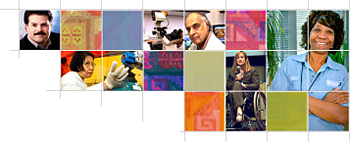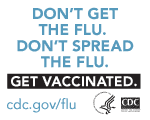About CDC
Hot Links
Conferences & Events
Outbreak: Plagues that changed HistorySeptember 27 – January 30, 2009
Organized by the Global Health Odyssey Museum; come see Byrn Barnard’s images of the symptoms and paths of the world’s deadliest diseases – and how the epidemics they spawned have changed history forever.
CDC Diversity

CDC/ATSDR Diversity Policy Statement
The policy of CDC is to ensure that diversity is an integral part of our day-to-day management and public health activities. Today’s workforce and the workforce of the future will be enriched by including persons from all backgrounds, value systems, and perceptions of the world.
We typically think of diversity as including age, ethnicity, sex, mental and physical abilities and characteristics, race, and sexual orientation; however, at CDC, we believe diversity also includes communication styles, education, family status, military experience, organizational roles and levels of responsibility, religion, first languages, geographic locations, income, work experience, and work styles. All of these factors play a critical role in shaping value systems, expectations, and experiences.
By ensuring a diverse workforce, CDC acknowledges, appreciates, and respects the differences we recognize in one another — including the varied perspectives, approaches, and competencies of those with whom we work and of the populations we serve around the world. As a management philosophy, ensuring diversity helps create a positive work environment where all employees have the opportunity to reach their potential and maximize their contributions to CDC’s mission. In addition, this management philosophy encourages CDC employees to demonstrate cultural adeptness in their relationships with CDC constituents and customers.
To facilitate CDC’s continued achievements in research, disease and injury prevention and control, and program excellence, we must continually recruit a multicultural staff. Moreover, we must encourage a fair and nurturing work environment for all employees through networking, team cohesiveness, motivation, innovation, and effective results. A culturally diverse and perceptive workforce can better serve our stakeholders, national and international colleagues, and the public.
By defining and demonstrating our principles of diversity, CDC’s staff can work more effectively. Those principles include managing the dynamics of differences among staff, conducting routine self-assessments, acquiring and institutionalizing cultural knowledge, and adapting to the cultural contexts of the communities we serve. We must incorporate these principles throughout our policymaking, administration, public health practice, and service delivery, and we must systematically involve our colleagues and customers by seeking their input on critical policy and program concerns.
Page last updated: July 18, 2008
Content source: Office of Enterprise Communication
Notice: Links to non-governmental sites do not necessarily represent the views of the CDC.

